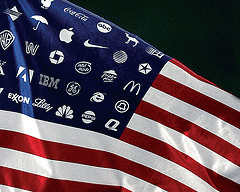We all
know that the economy is a mess. The public's perception of how bad the economy
really is, and what is in store for us in the future, varies from one
individual to another. One continuous perception that is reported on is that
during the great depression, the majority view was that things would get
better, that manufacturing jobs would come back, and that better times were
ahead. These viewpoints are not held, according to different polls, by the
American public today.
Americans
have seen our manufacturing sector shipped overseas mainly to take advantage of
cheap labor and also because of more liberal oversight of government
regulations. Working conditions are not regulated as much, unions are either
non-existent or ineffective, and the cost of doing business is much lower
overseas. It is really not too difficult to see why our manufacturing base has
been outsourced.
Most
corporations are now trans-national. Companies that were once American owned
and operated are now have board meetings with board members from every
continent. There is no loyalty to any one nation in much of the corporate
world. As the global economy changes however, and the United States escapes the
financial crisis that is plaguing Europe with the collapse of many EU members
economies, it may become an asset to remain in the US.
Asia and
Latin America have become players in the new world economy. As Europe gradually
becomes fractured, new opportunities appear in nations that have healthy
economies such as the BRIC nations (Brazil, Russia, India and China along with
nations such as South Korea, the Philippines and others). The competition is
fierce. The United States, while still the world's largest economy, can take
nothing for granted the way it did in the twentieth century.
It's a given
that both the workers in the U.S. and the employers must face a new reality.
The main problem that faces the U.S. is unemployment or under-employment. Young
people graduating from college are finding that getting a job is tough. Getting
a job that matches their degrees is even tougher. Many people hold the
corporate sector accountable for unemployment, but it is much more complicated
than that.
The sad
truth is that since 1970, the pay of the American working class has been more
or less stagnant, while productivity has skyrocketed. This is a new model for
Americans. In the past, as a company made money, the workers also made money.
This is not the case since the 70's.
Productivity has surged, but income and wages have stagnated for most
Americans. If the median household income had kept pace with the economy since
1970, it would now be nearly $92,000, not $50,000. ( Crooks and Liars )
The wages
of the American worker since the 70's has risen approximately 15% while
productivity has risen approximately 82%. Factors such as automation on the
assembly line and computers in the personnel department have contributed to
this. These factors also can be figured into job losses overall, this means
less people on the assembly line and less people in the personnel department
means fewer people on the payroll.
According to IPS, American
CEOs make 263 times the average compensation for
American workers, up from the 30 to 1 ratio in the 1970s. For comparison, the
average compensation of a Japanese CEO is less than one-sixth that of their American
counterpart and 16 times more than the average Japanese worker.
So who
is making money in the world's largest economy? What sector is the wealth going
to? Here are some facts that The NY Times doesn't put on their front page. In
2007 according to a University of
California study, the top 1% received 346% of the income in the US, while
the next 19% got 50.5% and the bottom 80% received a huge 15%. That means that
the top 20% received 85% of the nation's wealth. The top 1% average $380,354.00
and the bottom 50% averaged <$33,048.
The top 1 percent of earners receive about a fifth of all American
income; on the other hand, the top 1 percent of Americans by net worth hold
about a third of American wealth. (Note that the top income earners are not
necessarily the same people as the top net-worth Americans -- after all, lots of
high-net-worth people don't work or have much else in the way of sources of new
income.) Wealth-related inequality has also been relatively stable over the
last few decades, whereas income-related inequality has been growing since the
'70s. ( NY
Times 3/30/2011 )
That
covers income distribution, now let's examine wealth in the United States. In
2007, according to the same University of California paper UI mentioned
earlier, in 2007, the top 1% possessed 42.7% of the nation's wealth. The next
19% had 50.3%. That left the bottom 80% of Americans with 7% of the nation's
wealth.
In total
net worth, in 2007, before the housing
crisis, total net worth of Americans broke down with the top 1% having
34.6%, the next 19% with 50.5% and the bottom 80% owning 15%. That's a little
better, but not much. In 2009 the top 1% had 42.7%, the next 19% 40.2% and the
bottom 80% with 15%.
This
last bit of information means that 80% of us share 15% of the total wealth of
this nation that the government doesn't own. 15% of all private wealth!
Meanwhile, the detractors of the Occupy movement suggest that we all wear tin
hats. I beg to differ.
(Note: You can view every article as one long page if you sign up as an Advocate Member, or higher).





